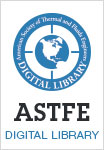
ISSN Online: 2379-1748
7th Thermal and Fluids Engineering Conference (TFEC)
SJR:
0.152
SNIP:
0.14
CiteScore™::
0.5
Indexed in
ENERGY EFFICIENCY STUDY FOR TWO-STORY HOUSE USING THERMAL NETWORK MODEL
要約
Air conditioning (AC) is a large portion of electricity consumption in modern households. Therefore, improving energy efficiency not only lowers property owners' electricity bills, but also benefits the environment by reducing carbon dioxide emissions. While AC can maintain room temperatures in homes, a plethora of insulation or heat dissipation strategies are available for reducing energy costs. This paper proposes a deterministic thermal network model to evaluate the performance of various methods of reducing AC expenses for a simple home geometry with day-night external oscillations. Estimated electricity savings can be compared to initial installation costs relative to the quantity of the installation, allowing for an understanding of which methods are more strategic investments for homeowners. The model indicates that in hotter regions, fan-powered ventilation is not cost-efficient. Radiant
barriers are typically the most profitable investments in comparison to standard thermal insulation, which is more
financially effective for long-term homeowners.